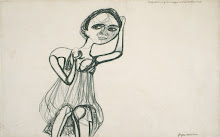Saturday, December 04, 2010
One afternoon, in the spring before his death, George, his illness consolidating, decided to dictate his memories and anecdotes from his life into a tape recorder. His wife was out shopping and so he took the recorder down to his work desk in the basement. He opened the door between his workshop and tool shop. There was a woodstove in the tool shop, between the drill press and metal lathe. He crumpled up some old newspaper and put it in the stove, along with three logs from the half cord of wood he kept stacked in a remote corner of the shop, near the door to the bulkhead. He lit a fire and adjusted the flue, hoping to warm the concretey chill of the basement. He returned to his desk in the workshop. There was a cheap microphone plugged into the tape machine that would not stay upright on the clip collared around it. The clip was so light that the twist in the wire running from the microphone to the recorder kept flicking it over. George tried to straighten the wire, but the microphone would not stand, so he merely placed it on top of the tape recorder. The levers on the recorder were heavy and required some effort to push down before they clicked into place. Each was labeled with a cryptic abbreviation and George had to experiment with them before he felt confident he had found the right combination for recording his voice. The tape in the recorder had a faded pink label upon which had been typed, Early Blues Compilation, Copyright Hal Broughton, Jaw Creek, Pennsylvania. George recalled that he and his wife had bought the tape at one or another of the Elderhostel college courses they had taken during one or another summers ago. When George first pressed the PLAY lever, a man's voice, thin and remote, warbled about a hellhound on his trail. Rather than rewind the tape, George felt that such a complaint might be a good introduction to his talk, so he just began recording. He leaned forward into the microphone with his arms crossed and resting on the edge of the desk, as if he were answering questions at a hearing. He began formally: My name is George Washington Crosby. I was born in West Cove, Maine, in the year 1915. I moved to Enon, Massachusetts, in 1936. And so on. After these statistics, he found that he could think of only doggerel and slightly obscene anecdotes to tell, mostly having to do with foolish stunts undertaken after drinking too much whiskey during a fishing trip and often enough centered on running into a warden with a creel full of trout and no fishing license, or a pistol that a doctor had brought into the woods: If that pistol is nine millimeters, I'll kiss your bare, frozen ass right out here on the ice; the lyrics to a song called Come Around, Mother, It's Better When You're Awake. And so forth. But after a handful of such stories, he began to talk about his father and his mother, his brother, Joe, and his sisters, about taking night courses to finish school and about becoming a father. He talked about blue snow and barrels of apples and splitting frozen wood so brittle that it range when you split it. He talked about what it is like to be a grandparent for the first time and to think about what it is you will leave behind when you die. By the time the tape ran out about an hour and a half later (after he had flipped it over once, almost without being conscious of doing so), and the RECORD button sprang up with a buzz, he was openly weeping and lamenting the loss of this world of light and hope. So deeply moved, he pulled the cassette from the machine, flipped it back over to the beginning, fitted it back into its snug carriage and capstans and guiding pins, and pressed PLAY, thinking he might preserve such a mood of pure, clean sorrow by listening back to his narrative. He imagined that his memoirs might now sound like those of an admirable stranger, a person he did not know but whom he immediately recognized and dearly loved. Instead, the voice he heard sounded nasaly and pinched and, worse, not very well educated, as if he were a bumpkin who had been called, perhaps even in mockery, to testify about holy things, as if not the testimony but the fumbling through it were the reason for his presence in front of some dire, heavenly senate. He listened to six seconds of the tape before he ejected it and threw it into the fire burning in the woodstove.
